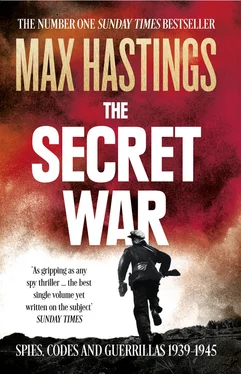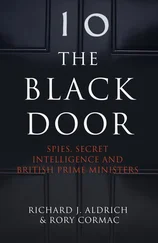Bletchley was also reading a significant portion of Italian naval traffic. On 25 March 1941, one of the small number of women decrypters, nineteen-year-old mathematician Mavis Lever in Dillwyn Knox’s team – he was famously supportive of talented girls in a male-dominated institution – played a critical role in breaking a message which revealed that the Italian fleet would shortly put to sea to attack British convoys. The warning enabled the Mediterranean C-in-C Admiral Sir Andrew Cunningham to contrive an encounter off Cape Matapan during the afternoon and night of 28 March which ended in a striking victory for the Royal Navy. By dawn on the 29th, three cruisers and two destroyers had been sunk, while the battleship Vittorio Veneto was damaged, an outcome that deterred the Italian surface fleet from making any further attempt to interdict British troop movements to Greece.
Spring brought an increasing flow of decrypts about Wehrmacht operations in the Eastern Mediterranean. Senior officers strove to streamline the transfer of information from Bletchley to battlefields, so that material reached commanders in real time. One of the most significant intercepts, detailing German plans for the May 1941 invasion of Crete, reported ‘probable date of ending preparations: 17/5. Proposed course of operation … Sharp attack against enemy air force, military camps and A/A positions … Troops of Fliegerkorps XI: parachute landing to occupy Maleme, Candia and Retiomo; transfer of dive-bombers and fighters to Maleme and Candia; air-landing operations by remainder of Fliegerkorps XI; sea-transport of flak units, further army elements and supplies.’ Churchill personally annotated the flimsy: ‘In view of the gt importance of this I shd like the actual text transmitted by MOST SECRET together with warnings about absolute secrecy.’ This information was passed to Wavell and Freyberg, the relevant commanders, at 2340 on 6 May. The loss of the subsequent Battle of Crete, following the German invasion which began on the morning of the 20th, emphasised a fundamental reality about Enigma decrypts: they could change outcomes only when British commanders and troops on the ground were sufficiently strong, competent and courageous effectively to exploit them. Stuart Milner-Barry of Hut 6 said that he and his colleagues looked back on Crete as ‘the greatest disappointment of the war. It seemed a near certainty that, with … every detail of the operation spelt out for us in advance … the attack would be ignominiously thrown back.’
The Cretan signal, informing British generals of German intentions in time to respond, was an exception rather than a commonplace in 1941. Bletchley was able to provide an ever-growing flow of information about the deployments of the enemy, not least in Eastern Europe, most of it derived from Luftwaffe and army-Luftwaffe decrypts. Wehrmacht traffic stubbornly resisted penetration, but German railway codes provided information about – for instance – troop movements to Yugoslavia, Greece and Eastern Europe in the summer of 1941. Hitler’s looming invasion of the Soviet Union, the towering event of the war, was also the first great strategic development for which Ultra intelligence provided explicit warning. While Britain had no power to influence or impede Hitler’s Operation ‘Barbarossa’, it was clearly of the highest importance to Churchill and his generals to be able to monitor its unfolding.
It became a source of increasing frustration to the prime minister that British troops in North Africa failed to frustrate or defeat Rommel when they had not only superiority in men, tanks and guns, but also an ever-growing stream of information about German deployments and movements, for instance at Halfaya Pass in May. Churchill pored intently over his own daily file of Ultra material. When he read a decrypt reporting petrol stocks at various Luftwaffe airfields in Libya, he scrawled on it in his red ink: ‘CAS [Chief of Air Staff] How many hours flying can their a/c do on this – about? WSC.’ Air Chief Marshal Sir Charles Portal responded testily: ‘Unfortunately it is not possible to make any general deduction since the figures only relate to the stock at Benghazi. We do not possess complete figures for the supply and consumption of oil and petrol throughout Libya. All we know is that there are indications of an overall shortage which is limiting operations in the forward area.’ This problem was endemic when decrypts were fragmentary. Stewart Menzies performed an important service by dissuading the prime minister from fulfilling his frequent desire to dispatch raw Ultra direct to commanders-in-chief in the field, as he had done in the case of Crete. ‘C’ was surely correct, on security grounds, and also because decrypts that lacked the context of other intelligence could be highly misleading to untrained eyes.
On land, in 1941 Bletchley provided more guidance to strategy than to tactics: it gave Churchill’s high command an authoritative, though never comprehensive, picture of German deployments in every theatre of war. Ultra could do little to assist the RAF’s ongoing struggle with the Luftwaffe for mastery of the skies. Only the Royal Navy gained immediate advantage, both in the Mediterranean and the Atlantic. Nothing altered the fact that, until the worldwide balance of strength began to shift in the Allies’ favour in the latter part of 1942, the operational superiority of German and Japanese forces enabled them to keep winning victories. Bletchley was an increasingly important weapon, but it was not a magic sword.
The practices and disciplines of GC&CS evolved progressively, with many wrangles and turf wars along the way. Deputy director Nigel de Grey complained about the ‘very low standards of military behaviour’ prevailing in what was supposed to be a military establishment. But how could it be otherwise? Noel Annan wrote: ‘Many of the cryptanalysts who produced Ultra were agnostic, heterodox dons who did not set much store by the normal interpretations of patriotism and democracy.’ It was not easy to combine the discipline essential to the operation’s smooth functioning with sensitivity to the wayward and frankly eccentric character of some of its resident geniuses. Col. Tiltman wrote ruefully on 2 March 1941: ‘Cryptanalysts have to be handled delicately and do not take kindly to service methods of control, which are essential to the good working of signals.’ When the director of the Royal Navy’s women personnel visited the Park, she demanded indignantly: ‘Why are my Wrens working with civilians?’ WAAFs in the teleprinter room expressed resentment about taking orders from civilians. In December 1940 the War Office’s director of military intelligence staged a grab for Bletchley’s military output. Until 1941, the Admiralty tried to continue some cryptographic work under its own roof. In Hut 3, rows erupted between representatives of the three armed services. Stewart Menzies received a constant stream of complaints from rival interests, while Bletchley staff referred to Broadway without enthusiasm as ‘the other side’. One of the most durable criticisms of ‘C’ is that he was ever eager to accept credit for the achievements of the Park, while declining to engage with its chronic resource problems, which eventually prompted the October 1941 letter to Churchill signed by Turing and his colleagues pleading for more staff, that caused Churchill to send his famous ‘Action This Day’ message: ‘Make sure they have all they want on extreme priority.’ It is a serious charge against Menzies, that he was an absentee landlord of GC&CS.
Yet all this made mercifully little impact on the work of the codebreakers. Edward Thomas, a naval officer who worked at the Park, was impressed by the absence of hierarchical distinctions: ‘Despite the high tension of much of the work … anyone of whatever rank or degree could approach anyone else, however venerable, with any idea or suggestion, however crazy.’ Few people of any rank or status felt denied a voice – an unusually rare and privileged state of affairs in the wartime institutions of any nation. From 1941, the Cambridge scientist and novelist C.P. Snow became a key Whitehall intermediary, responsible for channelling suitable mathematicians and other scholars to Bletchley. GC&CS also employed thousands of humbler folk, recruited chiefly for their language skills. Its files record details of some RAF personnel interviewed, such as Leading Aircraftsman Berry, aged twenty-three, who had started training as a pilot but re-mustered owing to his conscientious objections to dropping bombs. His German language skills were graded only ‘B’, and the recruiters noted: ‘if interested in work might do well, but needs careful handling’.
Читать дальше












